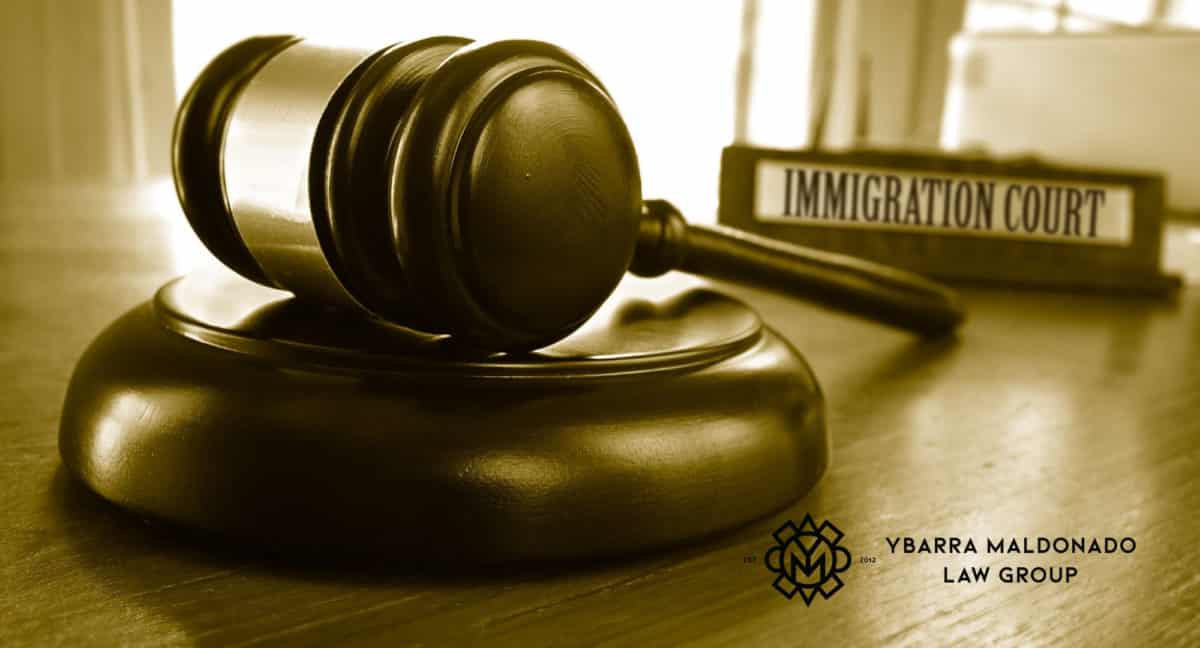Immigration Bond Lawyers in Phoenix, AZ
Home » Practice Areas » Phoenix Immigration Lawyer » Immigration Bond Lawyers in Phoenix, AZ
DON’T HESITATE TO REACH OUT TO US!
Our Law Firm is committed to becoming the best Law Firm for Latino, migrant, and Spanish speaking communities in Arizona.
Phoenix Immigration Bond Hearings

If you have been detained by immigration officials, you may be required to pay an immigration bail bond before you are released from custody. But what exactly are these bonds, and how do they work? To better understand the nuances of an immigration bail bond, we recommend speaking with one of our Trusted Phoenix immigration lawyers.
At Ybarra Maldonado Law Group, we understand that the immigration bail bond process can feel confusing and overwhelming. That’s why we offer top notch legal representation. We are proud to have a team of attorneys and paralegals that are passionate about helping immigrant communities in knowing and fighting for their rights. If you are confused about immigration bail bonds or other immigration procedures, you need a knowledgeable Phoenix immigration lawyer by your side. To schedule a consultation with us, please call 602-910-4040 or fill out our online intake form today.
What Are Immigration Bonds?
Also known by some as a “bond determination,” an immigration bond is a type of bail. Bail is how much money someone needs to post (pay) in order to be released from custody before their court date. Immigration bonds, rather than applying to alleged criminals, apply to non-citizens. The bonds aim to ensure that they show up for their court date.
Someone who is arrested for being in the United States illegally might be eligible to post an immigration bond. The amount of the bond depends on a variety of factors, which we discuss below. Immigration bail bonds are usually paid to ICE or Immigration and Customs Enforcement.
How to Post an Immigration Bond
There are two ways to post an immigration bail bond.
- The non-citizen pays the full bond amount upfront to the bondsman.
- The non-citizen pays a small percentage of the total bond amount. Then, the immigration bondsman posts the full bond amount.
Generally, the percentage that you must pay to immigration bail bondsmen is 10% of the full amount. For example, let’s say your bond is posted at $20,000. To get out of custody before your court date, you must pay $2,000 to the bail agent. It is important to fully understand the contract if you use an immigration bondsman. Many have been known to charge high interest rates and include other non-favorable terms.
Who Can Pay the Immigration Bond?
There are limitations as to who can pay the bond. For starters, whoever pays the bond amount must be a Lawful Permanent Resident (LPR) of the United States. They can also be a U.S. citizen. Either way, the bond contract will be in English, so the payer will need to be able to read it. Those who pay immigration bonds must bring their ID and their social security card.
It’s important to choose a trustworthy person to pay your bail bonds. When your case concludes, this person will have their money returned after you meet all requirements and appear at all immigration hearings.
So, how exactly do you pay bail bonds? Whoever is paying the bond must purchase either a postal money order or a cashier’s check from a bank. The check should be made out to “U.S. Immigration and Customs Enforcement.”
Regardless of the outcome of the case, the money will be returned, with interest, to whoever paid the bond amount.
How Much Does an Immigration Bond Cost?
In order to determine the amount of bond money you need, you will need to contact ICE. Usually, the detainee is already informed of their immigration bonds cost. However, any family member who wishes to inquire about the amount can call ICE at 602-257-5900, extension 3.
Immigration bail bonds vary in terms of amount for a variety of factors. One factor is the type of bond posted. Pursuant to statute, the minimum amount for a delivery bond is $1,500. However, they can be much more than that depending on certain factors, which we list below.
- Length of time the person has been living in the United States
- The extent of their family ties in the United States
- Whether or not the person has a criminal record, legal violation, or criminal history
- Employment history
- History of committing more serious crimes or immigration offenses
- Strength of immigration case
With many negative factors in play, an immigration bond based on the above factors may cost up to $25,000 or more. Voluntary departure bonds, however, are much cheaper. They usually cost up to $750.
How Do Immigration Bail Bonds Work?

When you are facing immigration court hearings and immigration bonds, it’s important that you understand how they work. If you are suspected of being in the country without legal status, you might be arrested by ICE and taken into custody. Then, a deportation officer will determine whether or not you are eligible for an immigration bond.
If you do not agree with the bond determination of the ICE Officer, you can ask for a custody redetermination hearing (bond hearing) in front of the Immigration Judge.
Immigration bonds work similarly to regular bonds posted for U.S. citizens who have been arrested and charged. Citizens charged with crimes can pay the bond money in order to be released from custody pending the finalization of their case in court. Undocumented immigrants can do the same.
Who Can Be a Sponsor for Immigration Bond?
What exactly is a sponsor for an immigration bond amount? Immigration bond sponsors are a requirement for detainees to be released from ICE custody. This release is not possible without a sponsor.
Usually, the sponsor is a close friend or family member of the detainee. The sponsor agrees to pay the bail bond agent on behalf of the detainee at their own expense. In doing so, they also guarantee that the detainee will adhere to every condition of their release order. As we stated before, the sponsor must also be a legal permanent resident or a U.S. citizen who can preferably read English.
Am I Eligible for an Immigration Bond?
Bond eligibility depends on a number of factors. The first step is proving that you are neither a flight risk nor a danger to the community or a national security threat. It is possible not to qualify for any kind of immigration bond. Generally, those who are not eligible have had serious criminal convictions in the past or have been deported before.
Other cases of ineligibility involve ICE thinking that the detainee is not cooperative. If ICE believes that you are not answering their questions or cooperating with them, they may deny your bond. If this is the case, we recommend that you speak with our experienced immigration lawyers as soon as possible. It’s important that you do this before your first bond hearing occurs. With some criminal convictions or entry status, it is possible an Immigration Judge does not have jurisdiction to grant a bond. Call one of our experienced deportation defense attorneys today to find out if you or your loved one is bond eligible.
Can an Undocumented Immigrant Apply for an Immigration Bail Bond?
Most undocumented immigrants may post bail and secure their release. However, those with a serious criminal history are less likely to qualify for bonds. Also, those previously removed who lack a criminal history may likewise be ineligible for a bond. Bond hearings take place in order to determine whether or not you are eligible for bonds. If you are found to be eligible, you or a family member can post your bond.
Types of Immigration Bonds

Delivery Bond
A delivery bond can be requested by someone detained by ICE. During your court hearing, the immigration judge sets your bail amount. After posting immigration bail bonds, ICE releases the detainee temporarily. They will ensure that you understand that you are expected to appear at your immigration court hearing. If you fail to appear at the planned court procedures, you will be detained by ICE. Additionally, your bond amount will be forfeited.
Another important part of delivery bonds is that they require both an arrest warrant and a custody determination from ICE. Before the immigration courts approve a bail request, they will ensure that you meet certain requirements. Once you are released from ICE custody, you should contact an experienced immigration lawyer to help with your case.
Voluntary Departure Bond
How to Request a Bond Hearing
In order to request a hearing before an immigration judge, you can either check the related box on Form I-286 or file a separate hearing request. If you cannot get a copy of your Form I-286, you can request your hearing in writing and send it to the appropriate court. It is also possible to request a hearing at your first hearing in court.
This first court hearing is called the Master Calendar hearing. It is not necessary to submit a request in writing if you submit an oral request at this hearing. The judge then makes the decision to hold your bond hearing right then or schedule it for sometime after the hearing.
If the judge reschedules your hearing for a later date, it will happen as soon as that court has time to hear it. Hearings for this particular case type are generally informal.
How Long Does It Take to Get a Bond Hearing in Arizona?
It’s important to keep in mind that just because you ask for a bond hearing does not mean you’ll be granted one. Working with an attorney can both improve your chances of getting a hearing and help you get a potentially lower bond amount.
Usually, a bond hearing will occur before your Master Calendar hearing. If not, you will need to request a bond hearing if you haven’t already. Waiting periods for bond hearings are set on a case-by-case basis. This is why it’s so important to work with a skilled attorney throughout the process.
What to Expect at an Immigration Bond Hearing?
It’s also important to understand what to expect at your bond and deportation hearings. If the detention center you are at has an onsite court, your hearing will happen there. If not, you will be transported to the court or allowed to set up a video conference call.
The judge will begin the hearing by looking over your immigration status. This will help them determine your bond eligibility. Then, they determine whether or not you are a flight risk based on the following criteria:
- Your family ties in the country
- Whether you own or rent your home
- Whether or not you currently have a job
- If you qualify for any type of relief from removal proceedings
We recommend that you invite any LPR or citizen relatives to your hearing. Although they likely won’t be asked to speak, their presence alone will help your case.
You can also produce the following evidence to support your case:
- Marriage certificates
- Birth certificates of your children
- Consistent pay stubs to prove employment
- Positive letters from your employer
- Letters from your loved ones to show your role in your community
Another factor that immigration judges look at is your criminal record, as we stated before. If you have any criminal or immigration charges on your record, you can still make a case for yourself.
Even with a criminal record, your friends and relatives can write letters to attest to your current good character.
How to Prepare for Your Immigration Bond Hearing?

Work closely with your immigration attorney to prepare for the hearing. Below, we outline the evidence that you should bring to the hearing.
- A sponsor letter that includes the following:
- An explanation of your relationship with the sponsor
- Proof of the sponsor’s immigration status
- An address of where you and the sponsor will live
- Pieces of mail that confirm the address
- An explanation of how the sponsor will support the detainee upon release
- One of many other types of supporting documents, including the following:
- Evidence of relief from deportation
- Your tax records
- As many letters of support as possible
- Proof of insurance, property ownership, debt, or armed forces service
- Proof of rehabilitation if you have a prior alcohol related offense
Contact Our Immigration Bond Attorneys in Phoenix Today
For more information about further immigration procedures, we recommend speaking with a trusted immigration lawyer about your case. At Ybarra Maldonado Law Group, we understand that it can be confusing and scary to handle these cases on your own. Thankfully, you don’t have to. Our passionate attorneys will fight by your side, providing support in the legal realm. We are proud to say we have attained favorable bond redetermination amounts in Eloy, Florence, and La Palma detention centers. To schedule a consultation with our Phoenix law firm, please call 602-910-4040 today.

